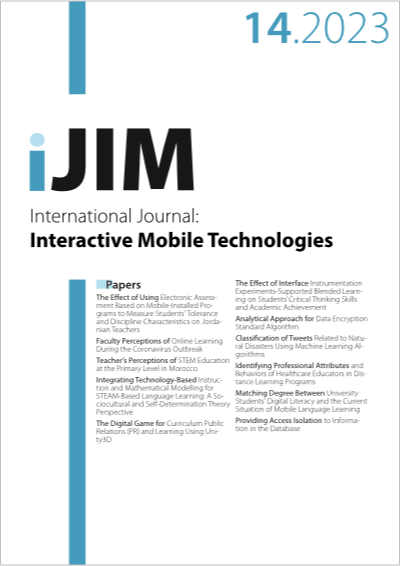Faculty Perceptions of Online Learning During the Coronavirus Outbreak
DOI:
https://doi.org/10.3991/ijim.v17i14.41685Keywords:
Online Learning, COVID-19, faculty members, Ajman University, higher educationAbstract
This study examined the perceptions of faculty members at Ajman University during the period of COVID-19 to estimate the reality of the experience of employing E-learn is applied during the 2020/2021 academic year at higher education establishments in UAE. A descriptive method was adopted in the research. The study participants consisted of all staff of the faculty (274) of Ajman University who were selected from different faculties with different specializations in the academic year 2020-2021. A questionnaire, consisting of (38) items, was developed as an instrument for the study after its validity and reliability were verified. The results indicated that faculty members' perspective of Ajman university as one of UAE universities as being highly prepared, well trained, and equipped to apply online learning at the period of the Covid-19. The findings also indicated that the faculty members’ perspective related to the process of teaching and learning via online learning reached at a moderate level, and the obstacles encountering the application of online learning reached at a high level, while their perspective concerning suggestions to develop the online learning experience was at mid-level. Faculty members' responses regarding applying online learning differed according to the college variables came with favor for Medicine college, depending on the year of experience (in favor of 5- to less than 10 years), and depending on gender and academic rank of faculty members (the perspective of faculty members is statistically insignificant according to the gender and academic rank variables)
Downloads
Published
How to Cite
Issue
Section
License
Copyright (c) 2023 Rasha Mohamed Abdel Rahman, Najeh Rajeh Alsalhi, Mohd. Elmagzoub Eltahir, Soumaya Abdellatif, Ahmad Mohammad Alzoubi

This work is licensed under a Creative Commons Attribution 4.0 International License.



